The Servants of India Society holds a significant position in India’s history, as it played a crucial role in the country’s struggle for independence and social reform. Founded by the visionary leader Gopal Krishna Gokhale in Pune on June 12, 1905, the society aimed to promote national education, social service, and upliftment of the underprivileged sections of society. Let’s delve deeper into the legacy of the Servants of India Society and its impact on Indian society.
Origins of the Servants of India Society
Gopal Krishna Gokhale, a prominent figure in the Indian National Congress, recognized the need for a dedicated organization that would work towards the welfare of the masses and the betterment of the nation. He envisioned a group of selfless and dedicated individuals who would dedicate their lives to the service of the people, placing the country above personal interests. This vision gave birth to the Servants of India Society, which drew inspiration from the teachings of Mahatma Gandhi and Rabindranath Tagore.
Objectives and Activities
The primary objective of the Servants of India Society was to promote social, educational, and economic advancement in India. Members of the society were known as “Gondavlakars,” meaning servants, reflecting their commitment to serving the nation. The society focused on various activities, including:
-
Educational Initiatives: Establishing schools and colleges to provide quality education to the masses, with a special emphasis on vocational training and technical skills.
-
Social Reforms: Working towards the eradication of social evils such as untouchability, child marriage, and discrimination based on caste, creed, or gender.
-
Political Awareness: Conducting campaigns and workshops to create political awareness among the masses and promote responsible citizenship.
-
Economic Empowerment: Initiating programs to promote entrepreneurship and rural development, focusing on sustainable practices and livelihood generation.
Impact and Legacy
The Servants of India Society left an indelible mark on Indian society through its relentless efforts towards nation-building and social transformation. The society’s emphasis on selfless service and community welfare inspired many individuals to join the movement and contribute to the country’s development. Some of the key legacies of the society include:
-
Leadership Development: Nurturing a generation of leaders who were committed to the ideals of integrity, social justice, and democratic values.
-
Educational Advancement: Pioneering initiatives in the field of education that laid the foundation for modern schooling and vocational training in India.
-
Social Reforms: Spearheading movements against social evils and working towards creating a more inclusive and equitable society.
-
Nationalism: Fostering a sense of national pride and patriotism among the masses, instilling a spirit of social responsibility.
FAQs about the Servants of India Society
- Who was Gopal Krishna Gokhale?
-
Gopal Krishna Gokhale was a prominent leader in the Indian National Congress and the founder of the Servants of India Society. He played a vital role in India’s struggle for independence and social reform.
-
What was the main objective of the Servants of India Society?
-
The Servants of India Society aimed to promote social, educational, and economic advancement in India through selfless service and nationalistic ideals.
-
How did the society contribute to education in India?
-
The society established schools and colleges to provide quality education, with a focus on vocational training and technical skills for the masses.
-
What impact did the society have on social reforms?
-
The society worked towards eradicating social evils such as untouchability, child marriage, and discrimination, promoting a more inclusive and equitable society.
-
What is the legacy of the Servants of India Society?
- The society’s legacy includes nurturing leaders, advancing education, championing social reforms, and fostering a sense of nationalism and social responsibility in Indian society.
In conclusion, the Servants of India Society stands as a symbol of dedication and commitment to the service of the nation. Its legacy continues to inspire generations of Indians to work towards a more just, equitable, and progressive society.


Recent comments